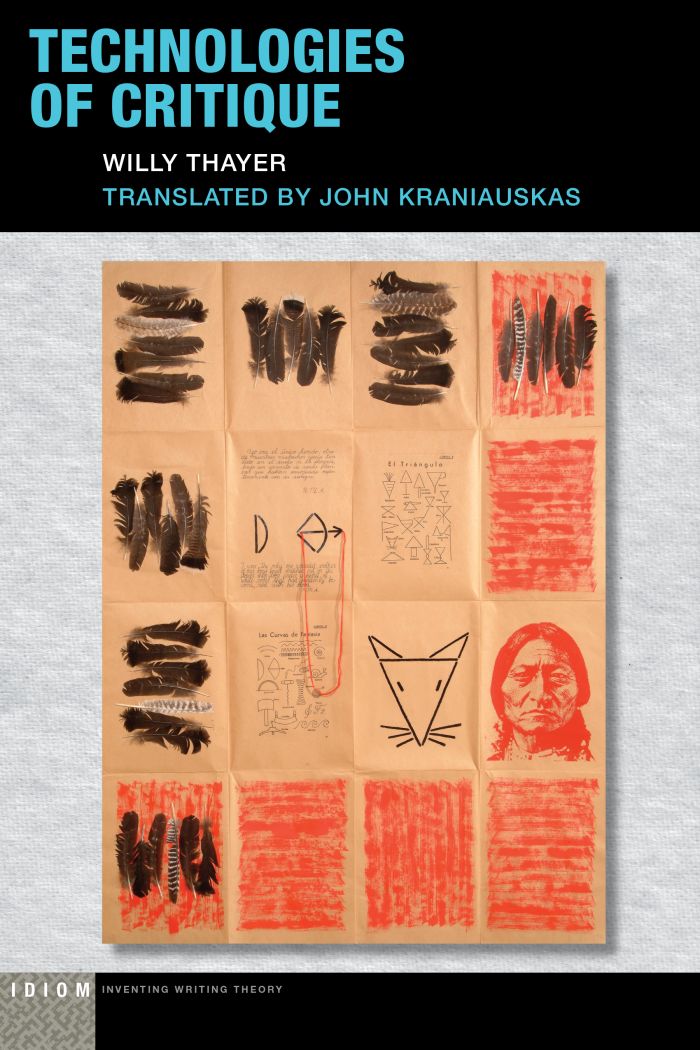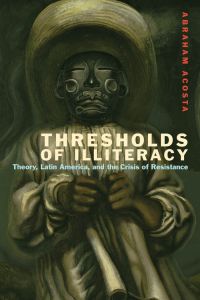Technologies of Critique

This book can be opened with

Willy Thayer belongs to the very core of Latin American thought today. He has produced decisive readings of the contemporary university, of avant-gardism during the Pinochet dictatorship, of the Baroque as a hermeneutic category for Latin American history, and of neoliberal actuality. This deeply original book deals with some of the most forceful and urgent conditions and preconditions of contemporary thought. It will be an essential contribution to contemporary Anglo-American discussions in critical theory and philosophy.—Alberto Moreiras, Texas A&M University
Thayer is one of the most important philosophers working in the Spanish-speaking world today. He reveals an entirely novel notion of the vanguard—both the artistic and political vanguard—and by extension, of the function of art in the contemporary world.—Brett Levinson, Binghamton University, SUNY
At a moment when critique would seem to have lost its aura, Thayer has succeeded in reconfiguring critique as constellation and construction. If, from Descartes to Hegel, critique has demanded sovereign totality and continuum, Thayer brings Benjamin and Deleuze into tense conjunction, performing the work of a minor critique as assemblage, montage, and erosion. In the tense interval between them, this work scintillates, brilliantly.—David Lloyd, University of California, Riverside
Willy Thayer is a prominent a prominent Chilean philosopher, art critic, and media theorist. He is Professor of Philosophy at Universidad Metropolitana de Ciencias de la Educación, where he founded the Program in Critical Thought, and Professor of Film Theory at Universidad de Chile, in Santiago. He has written many books in Spanish and has curated gallery exhibits and shows in Europe and Latin America. He has held visiting professorships at Duke Unviersity, Yale University, UNAM (Mexico), and Universidad Complutense de Madrid.
John Kraniauskas (Translator)
John Kraniauskas is Professor of Latin American Studies at Birkbeck, University of London. His most recent books are Políticas culturales: acumulación, desarrollo y crítica cultural (FLACSO) and Capitalism and its Discontents: Power and Accumulation in Latin-American Culture (University of Wales Press). He is the translator and editor of Carlos Monsiváis’s Mexican Postcards (Verso).
Translation Has Always Already Begun: Translator’s Introduction | vii
1 Critique and Life | 1
2 Critique and Work | 5
3 The Kríno Constellation | 8
4 Technologies of Critique | 10
5 The Word “Critique” | 14
6 Marx’s Critical Turn | 18
7 Crisis and Avant-Garde | 19
8 Critical Attitude | 24
9 Sovereign Critique I | 25
10 Hyperbole | 28
11 Sovereign Critique II | 31
12 The Epoch of Critique | 33
13 Critique within the Frame, Critique of the Frame | 35
14 Manet: The Kant of Painting | 38
15 Heidegger’s Demand | 40
16 Critique and Figure | 44
17 Thought and Figure | 46
18 The Leveling of the Pit | 49
19 The Clash of Film and Theater | 51
20 Critique’s Loss of Aura | 54
21 Critique and Mass | 55
22 Nihil and Philosophy | 60
23 Jenny | 62
24 The Epoch of Nihilism. Nihil as Epoch. | 66
25 The Exhausted Age | 70
26 The Coexistence of Technologies: Marx | 73
27 Referential Illusion | 75
28 Critique and Installation | 76
29 Critique as the Unworking of Theater | 82
30 Destruction | 86
31 Sovereign Exception, Destructive Exception | 87
32 The Absolute Drought of Critique | 95
33 Sorel: Sovereign Critique | 97
34 Benjamin: Pure Strike and Critique | 104
35 The Destruction of Theater | 107
36 Thought Is Inseparable from a Critique | 111
Notes | 115
Index | 171





